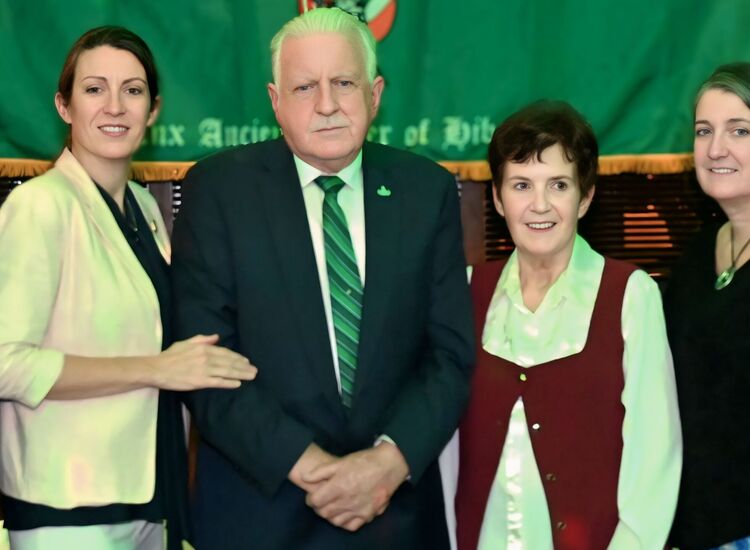Inis Lar, Aran Islands.
PHOTO BY JOE O'BYRNE
By Orla O’Sullivan
Joe O’Byrne was raised in Balbriggan, a coastal village north of Dublin City, but a very sheltered place compared to the Aran Islands, which provide the setting and the title for his latest play.
A sense of imminent death “very much informed” how Aran Islanders lived, O’Byrne said—particularly around 1900 when the play is set. (The sea took so many that the Aran jumper was developed as a way for families to identify their dead by each using a distinctive knitting pattern.)
O’Byrne, who has written or adapted more than a dozen plays, developed this one from a diary John Millington Synge kept during the years he lived part-time on the islands, which Synge published as a book.
“I put it together, so there’s a dramatic form to it. There are funerals, evictions, scenes from the pub, scenes on boats,” O’Byrne said. And for all that, the play, which opens on next Monday at the Irish Repertory Theatre, has a “very simple” set and just one actor.

Back in 1996, playwright Joe O’Byrne directed at the Irish Repertory Theatre “Frank Pig Says Hello,” Patrick McCabe’s stage adaption of his novel “The Butcher Boy.”
Brendan Conroy, a well-known stage and screen actor, plays multiple characters, including the old-style story tellers or seanchaí, who so fascinated Synge.
“These stories are not mythological,” O’Byrne said. “They’re about people, yet they’re kind of like fables.
“At that time the Aran Islands were considered far away and getting there was very difficult,” he added. “Synge found there what he’d call a ‘primitive culture’ still existing on the fringe of Western Europe.”
Just last year O’Byrne got a new appreciation of how cut off the Aran Islands still can be. When the play was staged there in August a storm made the 30-mile crossing from Galway “scary, even on a fairly big ferry” and travel between the three islands on the normal, smaller boats was impossible.
Synge was impressed by the self-reliance of the islanders when he first arrived there in 1898. “But,” O’Byrne noted, “his depiction was not heroic, not the mythological portrayal hoped for by the political nationalists.” (Audiences stormed out when Synge’s best-known work, “The Playboy of the Western World,” was first produced, in part because the central character admits to having killed his father.)
Ironically, it was one such nationalist who prompted Synge to write about the Aran Islands. W.B. Yeats, a fellow Anglo-Irish Protestant, encountered Synge, then a musician, in Paris.
O’Byrne added: “Yeats said, ‘If you want to be a writer, go to the Aran Islands, see the way people live and write about it.’ He did, and he wrote better plays than Yeats. Because he was a student of music, he had a very good understanding of form.”
Synge also learned Irish during the five summers he spent on the islands. He originally went there also partly to convalesce from Hodgkin’s disease. He died at age 37 in 1909—two years after “The Aran Islands” was published. It was illustrated by painter Jack B. Yeats, the poet’s brother.
The idea for a play based on Synge’s chronicle came from a conversation between O’Byrne and Conroy in Grogan’s bar in Dublin. And now he’s back at the Rep, where in 1996 he directed “Frank Pig Says Hello,” Patrick McCabe’s stage adaption of his novel, “The Butcher Boy”. The New York Times praised O’Byrne at the time as an “inventive” director. Meanwhile, reviewers in Ireland have identified similarities between that production and that of “The Aran Islands.”
That production was “very influential,” O’Byrne says, “The format became almost a staple in Ireland” and it also toured internationally, including to London’s Royal Court Theatre.
O’Byrne’s own wanderings brought him to the theatrical life, but not that typical rite of passage for Irish students, the J1 visa stay, although he’s been a frequent visitor to New York, particularly the Bronx where he has family connections.
After graduating from University College Dublin, he went to Berlin and fell in with a theatre group. So was born, in one sense, the future co-founder and long-time artistic director of Co-motion Theatre Company, Dublin. But the theatre training had already begun before Berlin without his knowing it. O’Byrne had at UCD switched from electrical engineering to arts courses. The former would become useful, however, as the playwright often does the lighting for his shows, including for the latest, “The Aran Islands.”
“The Aran Islands” by Joe O’Byrne, a one-man play with Brendan Conroy, adapted from J.M. Synge’s book, is at the Irish Repertory Theatre, 132 West 22nd St. from this week through July 23. Tickets from www.irishrep.org.








